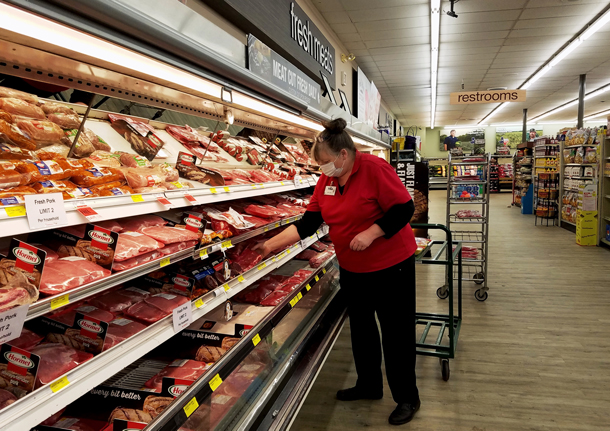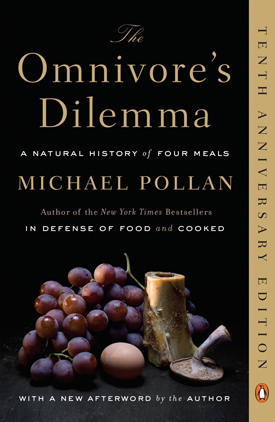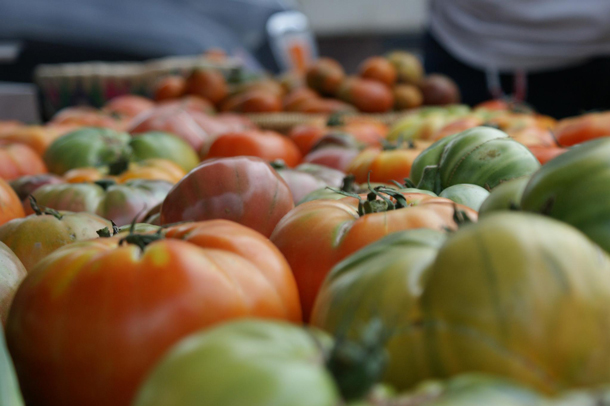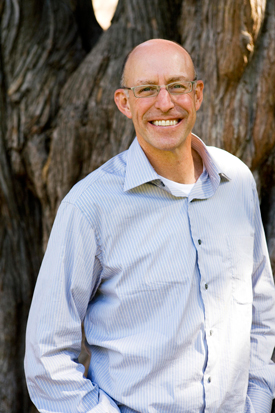Coronavirus Shocks US Food System
Air Date: Week of May 8, 2020

Health hazards at meat-packing plants have caused food shortages for meat. Pictured, a grocery employee restocking, wearing a mandatory mask. (Photo: Gilbert Mercier, Flickr CC BY-NC-ND 2.0)
The coronavirus has affected nearly all elements of the US economy, including food supplies. Michael Pollan, author of The Omnivore’s Dilemma and other books, says food shortages and massive food dumping during the COVID-19 pandemic expose major vulnerabilities in the American food supply chain. Pollan discusses with Host Steve Curwood how the pandemic presents a strong case for deindustrializing the food system.
Transcript
CURWOOD: From PRX and the Jennifer and Ted Stanley Studios at the University of Massachusetts Boston, this is Living on Earth. I’m Steve Curwood.
The pandemic has affected nearly every aspect of the US economy, including the food supply. Dairy farmers are dumping millions of gallons of milk, contract growers are plowing under perfectly good vegetables and industrial livestock farmers are euthanizing animals in the face of a corona virus outbreaks at meat packing plants. And at the same time grocery stores are running short of some supplies, including meat. Michael Pollan is the author of best-selling books including The Omnivore’s Dilemma and The Botany of Desire. He joins me now to explain this disconnect in our food system and the vulnerabilities laid bare by the pandemic. Michael Pollan, welcome to Living on Earth.
POLLAN: Thanks, Steve. Good to be back here.
CURWOOD: So, Michael, we're seeing a lot in the news lately about how the pandemic has affected the American food system: Shortages, massive amounts of food waste public health hazards and the meatpacking plants to name a few. What's happened?
POLLAN: Well, you know, we have a system of incredible efficiency, you know, the legendary bounty of the American supermarket is being challenged by two things. Initially, it was challenged by a demand crisis. At the beginning of the pandemic, you had people hoarding as they do before a hurricane or a blizzard. And this was emptying supermarket shelves, which, you know, is a phenomenon that feeds on itself. But then you moved into a second stage. And that's where I think we are now and increasingly are going to be, which is a supply problem. This hyper efficient system turns out to have some peculiarities that make it very ill suited to the kind of shock it's feeling.
CURWOOD: As I understand it, you're focusing on the fact that we have have what? Two food systems?
POLLAN: Yeah, we really do. You know, half the food dollars spent in America is on institutional food, the food you eat at work, the food you eat at restaurants, at schools, institutions of all kinds. And it has its own dedicated supply chain. And it's a dedicated group of farmers and meat packers and other people feeding into this institutional chain that has its own separate set of companies at every step of the way. It's that food chain that kind of has collapsed because people are staying home. They're not going to work. They're not going to restaurants. And it is proving very difficult to reroute all that food to the grocery outlet. Milk, for example. I mean, you know, in that food chain, it's not sold in quarts, or half gallons. It's sold in giant containers, meant to go into institutions and that milk no longer has a market. Those farmers and their distributors don't have an easy way to move it to the supermarket chain. It would involve new packaging, you know, whole new production lines. So they're dumping it and because obviously you can't store milk very long and they're plowing produce into the, into the ground. And so at the same time, we're seeing this colossal waste of food, you have lines at food banks, you know, hours long that could use that food. So you've got this specialization of supply. That was a great strength when everything was normal, but is an incredible vulnerability right now. And that's just, you know, one of these indicators that a system that's really efficient sacrifices, resiliency, and now it is resiliency that we need.
CURWOOD: So talk to me about the difference between an efficient food system and a resilient food system.
POLLAN: Sure. Well, you know, whenever you achieve efficiency, one of the things you're doing is sacrificing redundancy. So when we move from a system where we had hundreds of regional slaughterhouses Then 10s of thousands of small farmers, if there was a problem at any one of those slaughterhouses, it wouldn't be in the newspapers. It would just barely make a ripple in the food system because you had all this redundancy. But over the years, due to lack of antitrust enforcement and celebration of efficiency, we've allowed the meat industry to consolidate to a remarkable extent where you now have, for example, four companies slaughtering 80 or 85% of the beef, and something like 50 plants total are processing 98% of all the meat in the country. So yeah, that actually made meat cheaper. It was a more efficient system. But it leads to a situation where farmers who are raising meat say for a Smithfield plant in Sioux Falls, Iowa, and they're contracted to take their pigs there when they reach slaughter weight, suddenly that place is closed down by the governor because of the outbreak, and they've got nowhere to take their pigs. Because you can't simply feed your pigs longer, they get too big to go into the system and you've got baby pigs coming along very, very quickly. And that's why you see the destruction of all these food animals. Millions of food animals are being euthanized right now, because there's no slaughter plant to take them to.

Pollan is most known for his 2006 best-selling book The Omnivore’s Dilemma, where he delves into where American food comes from. (Photo: Courtesy of Michael Pollan)
CURWOOD: Now, as you've mentioned, one of the priorities of American food policy for decades has been to keep food, quote, cheap. Now, on the one hand, that sounds great if you're fighting against hunger, and it's less expensive to feed people, but what's the defect in this logic?
POLLAN: Well, as I've been saying, for years, there's a high cost to cheap food. You don't get cheap food without sacrificing other values. And yes, you're right. We have put price at the center: pile it high and sell it cheap is the motto of the American food system. And we've gotten really good at that. But in the process, I mean, we had to make certain sacrifices. One is growing the animals in these brutal conditions, you know, shooting them full of antibiotics and hormones, so they'll grow more quickly and withstand the conditions they live in. And then with the workers, you know, the slaughter plants used to be in Chicago, and they were unionized at great pain during the 20th century. And now, you know, they've moved the plants to the High Plains near the feedlots, to escape unions, by and large and filled them with many undocumented workers who work for, you know, really low, low wages. And they've also made it the most dangerous job in America working in a slaughter plant, because the line speeds are so fast.
CURWOOD: So Michael, just how quickly do these slaughterhouses, these slaughter and packing plants work?
POLLAN: Well, in the case of chickens, it's 175 birds per minute. Okay, flying by you on a line, they hang them from a conveyor, there's a knife that cuts their necks. And then the workers are opening them up, you know, de-gutting them and cutting them into parts. And the result is a very dangerous situation dangerous for the workers, formerly because they'd get cut a lot. And now because they get infected a lot. A slaughterhouse, you know, has thousands of workers, they're working shoulder to shoulder on production lines. The meat or the carcasses are coming so fast, they say they can't even pause to cover a cough without the carcasses flying by them. They can't get permission to go to the bathroom without whispering directly into the ear of a supervisor. So it's a very intimate place. Add to that the fact that a very high percentage of these workers are undocumented immigrants who have no health care, who have no sick pay, and indeed they're being forced to work even when they're sick. The meat system right now is is really one of the hot zones for this whole outbreak. There are thousands of meat workers all across the country now who are infected. Last count I saw about 20 had died in this industry. And they have no choice but to return to work every day.
CURWOOD: So, Michael, I have to ask you this. So the dollar cost at the checkout counter is low for this kind of food. But what's the real cost as a society we're paying with the health impacts of such a high meat diet?
POLLAN: Well, you know, this is a dimension of the pandemic and the food story that I don't think is getting nearly enough attention. We have learned that certain underlying conditions predispose people to severe cases of COVID. And the most important appears to be right now high blood pressure hypertension. 59% of the serious cases have an underlying hypertension. The other conditions are obesity and Type Two Diabetes. Now all three of these, I mean, let's connect the dots here. These are chronic diseases linked to a bad diet, to a diet of fast food, lots of meat, lots of sugar, essentially processed food. We may be eating precisely the wrong diet as a nation to withstand this pandemic. So, you know, I think it's yet another argument for, you know, changing our diet, that the way we eat, we know that the American way of eating is killing us, usually quite slowly. Here is a case where it may be killing us a lot more quickly.

Tomatoes for sale at a farmers’ market in Bloomington, Illinois. Pollan advocates for the local food system. (Photo: Gemma Billings, Flickr CC BY 2.0)
CURWOOD: So it's very likely that this is a major historical inflection point that we're living in right now. Something like the Great Depression. What do you think the COVID-19 disaster pandemic will do for how we handle our food supply and related health concerns going forward once the dust settles?
POLLAN: Well, you know, in my more pessimistic moments, I think we'll try to get back to what we call normal and put this behind us and not make the kind of changes we need to make. But in fact, this pandemic has exposed enormous vulnerabilities in our economy in our society. And in our food system. It's very easy to imagine a leader, a party, creating building a new politics, around the common theme of addressing the problems that the pandemic exposed. One, of course, is the so called essential worker, a term you never used to hear before. And there is this paradox that we've learned that these essential workers are the most mistreated and lowest paid. And there's something very wrong with this picture. And one thing that should come out of this and I hope will is addressing the inequities of the people we depend on most are the people that get the lowest salary and are treated the most abusively in the workplace. In food, it would mean I think decentralizing, de-industrializing the food system to the extent that we can. We tolerated the concentration of the meat industry and other parts of the food industry, because it promised lower prices to consumers. And it did deliver that. But if you think about the cost now, in terms of the fragility, the brittleness of the food system, it was too high a price to pay.
CURWOOD: Michael, what's the role of local agriculture in this and this phenomenon of community supported agriculture, the CSA is that seems to be growing.

Michael Pollan an author, journalist, Professor of Journailsm at UC Berkeley and the Lewis K. Chan Arts Lecturer and Professor of Practice of Non-Fiction at Harvard University. (Photo: Alia Malley)
POLLAN: You know, we described these two food systems we have but of course, then there's yet another which is the local organic, you know, regional food system. And it's been very interesting to watch how that has adjusted. It is turned out to be more adaptable. Farmers that were selling to restaurants for example, many of them are starting CSAs, these box schemes where you get a weekly box of produce and pick it up at a location. This marketplace is thriving right now. And these are smaller farms that can make adjustments and seek new markets. To give you an example here in my community, there was a local restaurant that has been an institution here for almost 50 years, closed down on March 15, when we were sheltered in place, and there were two or three farms that really depended on this restaurant for their support. They provided most of the produce. They set up a CSA, and every week now on Sunday, I go to this restaurant and receive a box of produce that they've put together from these farmers and this is keeping the farmers going. And it gives me a chance to see my neighbors and the people who worked in this restaurant, you know, at a distance behind masks, but it feels great to shop that way and you're supporting the restaurant. You're supporting the farmers and you're supporting yourself with some of the the best produce you can possibly buy. And I don't know about where you are. But here the farmers markets, you know, have adapted, they all have touchless payment now and they meter the number of people coming in. And they seem to be doing very well also. So we haven't completely lost the old, redundant local food system. In meat, we almost have, there's very little of that left. But in produce, it still exists. And I think if there's a lesson to take away from this, it is that in the same way, we realize it's a huge mistake to have a country that can't produce its own surgical masks and depends on China for that and various other products, including drugs of all kinds. It's a huge mistake to put all our eggs in one industrial basket, and that there has never been a more eloquent case for diversifying the food chain for having many different ways to get ourselves fed, not just this supermarket food chain and just support local agriculture as a matter of national security.
CURWOOD: Michael Pollan is a best selling author, journalist and activist based at the University of California Berkeley. Michael, thanks so much for taking the time with us today.
POLLAN: Thanks, Steve.
Links
Living on Earth’s coverage of Michael Pollan’s Book The Botany of Desire
Living on Earth’s coverage of Michael Pollan’s Book In Defense of Food
Living on Earth wants to hear from you!
Living on Earth
62 Calef Highway, Suite 212
Lee, NH 03861
Telephone: 617-287-4121
E-mail: comments@loe.org
Newsletter [Click here]
Donate to Living on Earth!
Living on Earth is an independent media program and relies entirely on contributions from listeners and institutions supporting public service. Please donate now to preserve an independent environmental voice.
NewsletterLiving on Earth offers a weekly delivery of the show's rundown to your mailbox. Sign up for our newsletter today!
 Sailors For The Sea: Be the change you want to sea.
Sailors For The Sea: Be the change you want to sea.
 The Grantham Foundation for the Protection of the Environment: Committed to protecting and improving the health of the global environment.
The Grantham Foundation for the Protection of the Environment: Committed to protecting and improving the health of the global environment.
 Contribute to Living on Earth and receive, as our gift to you, an archival print of one of Mark Seth Lender's extraordinary wildlife photographs. Follow the link to see Mark's current collection of photographs.
Contribute to Living on Earth and receive, as our gift to you, an archival print of one of Mark Seth Lender's extraordinary wildlife photographs. Follow the link to see Mark's current collection of photographs.
 Buy a signed copy of Mark Seth Lender's book Smeagull the Seagull & support Living on Earth
Buy a signed copy of Mark Seth Lender's book Smeagull the Seagull & support Living on Earth

